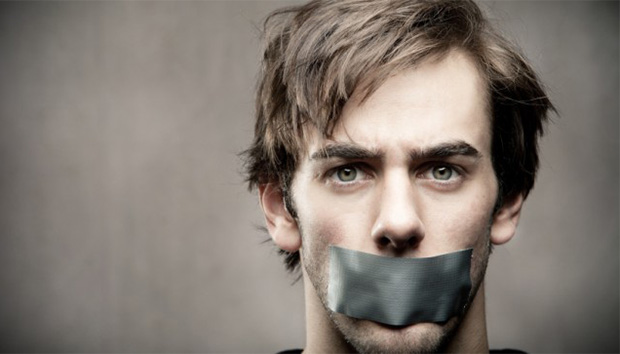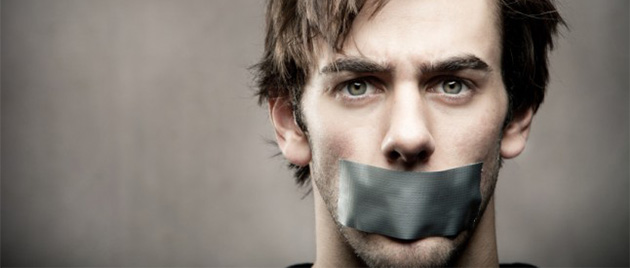Watch Your Mouth
 “Are you recording this, you f*ggot ass n*gger?” Unfortunately for Syracuse University senior Hanna Strong, the answer to this question was, well, yes.
“Are you recording this, you f*ggot ass n*gger?” Unfortunately for Syracuse University senior Hanna Strong, the answer to this question was, well, yes.
A few have no doubt sympathized with Strong after the incident in early September, defending her on the grounds that she was sloppy drunk when she threw together the equally sloppy insult captured in a 12-second Instagram video. After all, this was Juice Jam weekend at the No.1 party school in the country. But when Strong, in the same video, proceeded to invite those witnesing the disturbing incident to call her out on using the N-word, she did not expect the entire student body to chime in on social media as well. Students also seemed just as eager to call her out on her language being homophobic in addition to racist. Chancellor Kent and Coach Wheddon soon followed in the collective outrage.
Students and faculty, it appeared, would not let this be dismissed as merely a drunken mishap – nor would burn off like a mental haze after a night of heavy partying. This was sober and serious stuff, confirmed by the sudden appearance of hashtags devoted to the controversy, including #SpeakUpSU, #OUTSpokenSU, and #ITooAmSU. The campus could not be more polarized, and strong opinions have flooded social media, classrooms, and cafes.
Although many expressed similar outrage, there are some who would concede that this was still an act of protected free speech. So, this opens the question: Should offensive language like this be protected under First Amendment guarantees of free speech? And, should this principle be extended to private universities, like Syracuse University, which have adopted speech codes that seem to trump these Constitutional rights?
Regardless of where one stands on this issue, if any good has come out of the Hanna Strong affair, is that it has cracked open this debate.
Some advocates of unrestricted free speech argue that continued use of offensive words eventually defangs them – somewhat in the way that comedian David Chappelle freely uses the N-word. Others feel these words should be parodied, as in the South Park episode “The F-word” in which the cast tries to change the meaning of the word faggot from a homophobic slur to one that means “loud and obnoxious Harley bikers.” Indeed “faggot” is now more often than not decoupled from any reference to sexual orientation, which could make it unfair to outright label Strong a homophobe.
It is important to recognize that protection of free speech does not imply protection from criticism. This concept was grasped by Nardos Zecarias, an SU student, who tweeted “‘your 1st amendment rights means that u have the right to say anything but that does not mean you're free from all consequences’ #SpeakUpSU.”
Checking the temperature of social media at SU, most believe Strong deserves reprimand, particularly since she is a soccer player, and athletes are supposed to have high standards of public conduct and social equality. Others believe Strong’s punishment should go beyond simple reprimand, as noted by “Baddd Teacher,” an SU student on twitter. She stated, “Suspension really isn't enough. @SyracuseU needs to take a real stand against racism. #SpeakUpSU #BeingBlackatSU.”
While Syracuse University has ranked high in its commitment to partying by the Princeton Review, it ranks far lower on another less familiar list, published by the Foundation for Individual Rights in Education (FIRE). Using a traffic light as a metaphor, FIRE assigns a green, yellow, or red light to campuses according their commitment to free speech. Again this year Syracuse University has earned a Red Light designation, symbolizing that free speech rights ‘stop’ when students cross the threshold onto campus grounds. Extending the metaphor a bit further, this red light creates an unflattering reflection in the wide glass windows of the S.I. Newhouse building where our First Amendment rights are indelibly etched. This paradox was not lost on students (and Student Association representatives) who spray-painted “#1 in communications, last in free speech” on the side of Newhouse 3 last year.
These students weren't too far off the mark. In 2011, Matt Werenczak was suspended after posting a comment on his Facebook page stating “Syracuse NAACP Rep: ‘we need to start hiring our teacher from historically black colleges.’ Mind you two white tutors were in the room. I’ll let you take your own inference from that. Because that sort of stuff matters.” Ironically, Werenczak was expressing his discontent over the comment, which he believed to be racist. Werenczak’s suspension earned SU a spot as the #2 worst campus in the country for free speech by FIRE, as reported in the Huffington Post. This was an improvement from 2011 when SU actually topped the list after considering the expulsion of a student for creating a satirical fake-news blog about life in law-school. The post was labeled “harassment,” and therefore a violation of the SU Student Code of Conduct. However, nowhere was it specified what was said to qualify it as such, or how it even remotely applied to the SU definition of harassment.
When we asked Professor Roy Gutterman, head of Newhouse’s Tully Free Speech Center, about the harsh SU ranking by FIRE, he said, “I think this is an accurate rating.” He went on to say that, “the speech code is not what it could be… in the past it has been applied way more aggressively… but there’s definitely room for improvement.”
Gutterman added, “We should allow discussions and debate even about ideas that are offensive and speech that is offensive.” But it appears many on campus disagree with this opinion.
SU, like many other private campuses, has adopted a speech code, or rather a set of policies that limits students’ rights to free speech by prohibiting certain types of speech as punishable violations of student conduct. These types of codes were popularized in the 80s and 90s to confront and neutralize racism and prejudice as campuses became more diverse. But one has to ask if these codes serve any purpose in today’s fully diversified campus community. In fact, most public universities have abandoned speech codes as unconstitutional, and, as far as I know, the N-word or any other offensive epithets have not flourished on these campuses.
Of course we should not have to choose between free speech and a safe learning environment – it should not be an “either/or” situation. As Gutterman stated, it is possible for SU to have “a safe, healthy campus with wide open debate.” There are lines that need to be drawn, such as in cases of true harassment. But, Gutterman went on to note that harassment is “repeated, threatening behavior, like stalking.” It is not one or even two incidents. It “requires repetition,” he explained. It became clear the point he was trying to make: Strong’s words do not qualify as harassment. This was an isolated, private incident that just happened to get caught on video and thrown into the public through social media. The context of Strong words still remains unknown. The details are still missing.
Gutterman concluded that Syracuse University “has an obligation to protect students form these type of things… but it also has an obligation to protect free speech rights and values as well.” I could not agree more.
Stepping outside the sanctuary of private universities, the national dialogue surrounding free speech is much more friendly to the open exchange of unfriendly ideas and opinions, unfettered by arbitrarily imposed speech codes. For example, on March 10, 2006 Fred Phelps and the Westboro Baptist Church showed up at the funeral of Lance Corporal Matthew Snyder, carrying picket signs defiantly displaying phrases such as “Thank God for Dead Soldiers,” and “Fag Troops” (what this means exactly, no one knows…). While the Snyder family sued the Church for defamation of character and violation of privacy, the courts ruled in favor of the Westboro Baptist Church, stating the picketing was protected under the First Amendment.
Similarly, on SU’s campus, Jim Deferio, a highly religious Syracuse resident, has been known to stand behind Schine Student Center, preaching his small-minded and bigoted views on the LGBT community. Deferio claims being gay is a sin — adding to the endless number of “sinful acts” religion condemns and deems “immoral.” However, his bigotry does not end here. Students claimed that Deferio also shouted racist statements and prejudiced comments demeaning other religions. Deferio has denied these claims.
Freedom of speech is far more than simply an open pass to say whatever the hell one wants. There is little debate that the picket signs of the Westboro Baptist Church, Deferio’s religion-infused bigotry, and the insult that drunkenly spilled out of Strong’s mouth, are offensive and qualify as hate speech. Yet many are unaware that even hate speech is protected under the First Amendment. And placing limitations on this type of speech is, in the end, more harmful than the speech itself: it cheats us out of the right to listen, to evaluate our own prejudices, and to speak out with equal force to change the minds of others.
As the incident with Hanna Strong demonstrates, the forum of public opinion is a far more powerful tool for progress than any arbitrarily defined speech codes. It has become clear that “f*ggot ass n*gger » is not a popular choice of words to use as an insult, and Strong has been duly punished by her peers after attempting to do so. We cannot forget that Paula Dean, a cook on the Food Network, and Michael Richards, a comedian most recognized for his role as Kramer on Seinfeld, both used racial slurs that essentially torpedoed their careers. Similarly, Strong’s future athletic career has been placed in jeopardy after being suspended by the athletic department for her comments.
SU prides itself on its commitment to diversity. It then comes as no surprise that SU has adopted and coveted its speech codes in the name of social progress. But speech codes, and the fear of punishment for violating them, seriously undermines an equally important commitment to First Amendment guarantees of free speech. As a result, restrictive speech codes can have the unintended consequence of suppressing the free and open exchange of ideas. Perhaps it is time to abandon these codes as an anachronism and allow a full diversity of ideas to defend diversity on campus.

